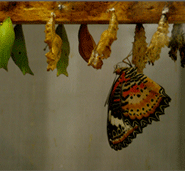Fate? Or Chance? Is always the question. Were you at the right place at the right time, or were you pre-ordained to have, at 1.53am, met the love of your life, as you seemingly randomly decided to take a night walk to buy a tub of ice cream that you would eventually forget to buy? You had fallen asleep on the couch because today was the big speech, otherwise you would be snoring in bed right now. You woke with a start when a fire engine passed by, and you realized you had broken into a sweat. The night was hot, and when you opened your window to let the breeze in, you smelled something so raw and real, you felt an overwhelming desire to take a walk. And to eat ice cream. And there he was: Indian marigold tucked behind his ear, The Winter's Tale in one hand and... ice cream in another. Butterscotch with blueberries. Need I go on?
The debate on free will and predestination began even before Julien Offroy de la Mettrie, in his 1748 L'Homme Machine, said: "Perhaps, the cause of mans existence is just in existence itself? Perhaps he is by chance thrown in some point of this terrestrial surface without any how or what". Simultaneously, Newton proposed his billiard ball theory, in which the universe might swerve in a definite combination of ways with predictable outcomes. This large dilemma will always be table talk, because, ultimately, how can we know? What appears random is possibly highly organized, and that with order might be inherent with chaos.
What I find particularly interesting is how we might UTILIZE the chance-like to create our destinies (or assume the illusion that such a thing can happen). What happens when you are desperately trying to write a line and the shrill wrrrrrrrreeeeeeee of a drill in the back forces your attention to itself? INCORPORATE the sound into the line. It'll only be better for it.
Having recently seen Philip Glass' autograph score for his opera Einstein on the Beach, I learned about how he used the solfege syllables and numbers on the side of the sheet music (normally used as placeholders for singers to memorize their song) as the text for the song itself. On further delving into this universe of utilizing the spontaneity of process, I happened upon John Cage's practice of Aleatory Music, wherein a significant chunk of a composition is left entirely to the whim of chance. I realized quickly that what they did in music, we all do in life. We use chance to opportunity because it allows us to scale down our lives, to live happily in a given niche, and to accept the unpredictable as a thrilling movie, ripe with suspense and hermeneutic tension.
What happens when you slip and fall and can't attend the party that you were on your way to? You get time to rest, read, be with yourself. Using accidents allows you to see the positive side of everything.
And so chance figures into The Fuschia Tree's Fall Issues, under the umbrella of
The
Anti-
Fall
:The Idea that Things Are Looking Up, that we are heading towards an optimistic age of doing the things we love because we love to do them, and finding kindness in the unkindest cuts.
And so were the post-it notes, cellophane and velcro, some of the most useful inventions, accidental discoveries.
The issue this fortnight, thus, brings you four exciting pieces that span the scope of the idea of Chance.
David Tappeser, a jazz musician based in Paris, leads us through five pieces of music comparing the tight structure of the North Indian rag to the open improvisation of Free Jazz.
Himraj Soin utilizes the idea of imitation and improvisation by redrawing five Calvin and Hobbes comic strips, and adding subtitles of his own. How does one mere cause affect the entire strip? The illustrator becomes his protagonist, lazy and hating the idea of work, and is therefore fated to be a mere imitator. Eventually, he can no longer come up with his own subtitle either. What happens to the artist when he has no free will?
Waylon D'Mello writes a story based on Aakash Nihalini neon geometric cubes. How does our sense of the world shift and how is our awareness of the mundane actually heightened through the accidental brush of something else?
And countering the ideas of chance, we see art that utilizes the control: Prajakta Potnis' surreal photographs inside refrigerators, create lacey worlds where the imperishable and the perishable encounter one another. The fridge becomes a metaphor for an environment that is completely controlled, and therefore an atmosphere where neither nature nor nurture are allowed to play their tricks.
The idea of the issue is to show you how beauty can be created, by chance.
In making a background for our new issue, I happened upon this site: http://jacksonpollock.org/. Make your own Pollock.
You'll realize how mathematical and ordered chance is.
So sift through our images, listen to the music, detect the indescrepencies. And if you JUST happened to have been thinking about exactly that, you'll know it was fate. Or Chance.
In all probability,
Himali.


